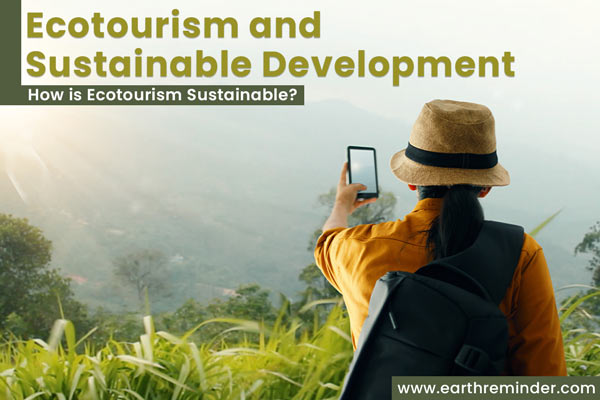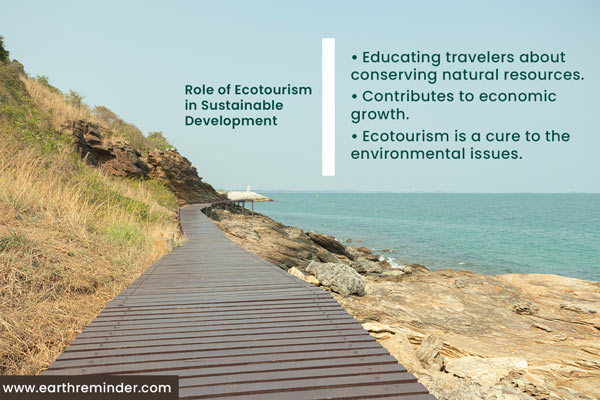Ecotourism and Sustainable Development | How is Ecotourism Sustainable?
Ecotourism and Sustainable Development: When we grasp sustainable development goals, there is some confusion in our minds. Can we be sustainable while continuing tourism activities? That is where ecotourism comes into being.
Ecotourism is a type of alternative tourism where we spend time with nature while remaining environmentally friendly.
In other words, through ecotourism, people travel to natural areas and participate in learning about the natural aspects of a place along with the cultures without harming it anyway.
Ecotourism helps us in sustainable development because it allows the local communities to earn some money for living. It improves the economic value of the country.
Further, ecotourism practices make tourists conscious of the natural beauty and not harm it anyway. Here in this article, we will elaborate on ecotourism and its contribution to sustainable development. So, let’s dig deeper.
Table of Contents
Ecotourism vs Sustainable Tourism
Along with ecotourism, you might also have heard of “sustainable tourism.” But what is the difference between these?
Ecotourism is a type of sustainable tourism where we majorly focus on observing nature and taking education from the communities and the natural beauty. Ecotourism supports the local communities economically while providing an environmentally friendly experience to the visitors. According to Fennell, we can see ecotourism as ethically managed to be low-impact, locally-oriented, and non-consumptive.
On the other hand, we can define sustainable tourism as all forms of tourism that follow sustainability principles. That means visiting a site and taking care of the environment, economy, and the socio-cultural aspects of tourism.
How Does Ecotourism Contribute to Sustainable Development?
As we understand the difference between ecotourism and sustainable tourism, let’s know how ecotourism is sustainable and its role in sustainable development.
Sustainable development has started with the goal of practicing sustainability to secure a healthy future for our upcoming generations.
While increasing the urbanization scopes, keeping the natural beauty and green space in different areas are essential to continue the interaction between humans and nature.
And that is why, nowadays, all the urban planning focuses on keeping nature intact. Ecotourism practices are increasing that way. Different countries are adopting the concepts and trying to follow the guidelines strictly.
While some countries try to obey the conservation rules and sustainable usage of natural resources, others have little attention to broad environmental issues like climate change, commercial carbon emission, and pollution.
Therefore, adopting ecotourism principles could help us observe and access the natural environment of different regions without disrupting its beauty.
What Is Sustainability?
This rate of resource consumption and increased population might bring a day when there is a scarcity of everything among people. Our future generations will suffer a lot. And therefore, fulfilling the current human need, keeping an eye on the social, environmental, cultural, and economic aspects, and conserving resources is what we call sustainability.
What Is the Principle of Sustainable Development?
The central principle of sustainable development is to fulfill the aspiration and needs of the current population without compromising on the future of upcoming generations.
And the concept of sustainable development has come into being after the industrial revolution. It’s a comprehensive, human-focused, and integrated approach to our future. After developing industries and technology innovation, new issues are also emerging. The concept of sustainable development was taken to fight against such issues.
What Is the Role of Ecotourism in Sustainable Development?
Ecotourism contributes to sustainable development firstly by following the principle of nature conservation. The first principle of ecotourism is to “reduce the adverse effects on nature and culture that could deteriorate the destination.” And this also contributes to one of our sustainable development goals. Further, it focuses on educating travelers about conserving natural resources.
Secondly, the motto of ecotourism as part of sustainable ecotourism is to reduce the harmful impact of mass tourism. And ecotourism is a cure to the environmental issues raised through traditional tourism. In ecotourism, tourists follow some measures for preventing the rise in carbon footprints per individual. This is a massive contribution towards our thirteenth sustainable development goal: climate action.
Thirdly, ecotourism contributes to economic growth by providing an alternative source of earnings to the local communities. This also helps to sustain the cultural aspect of a region.
Another way ecotourism is helping us to reach our sustainable development goals is by focusing on developing infrastructures that can minimize the usage of fossil fuels and the rising environmental issues.
In different ways, ecotourism contributes to sustainable development through preserving and protecting the natural environment while also focusing on the socio-cultural aspects.
Conclusion
There is no doubt that ecotourism principles align with the concept of sustainable development. However, there are still some challenges to developing such innovative techniques and frameworks.
Therefore, various studies are going on to solve the emerging problems and work vigorously towards our sustainable development goals.

